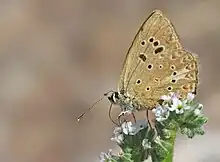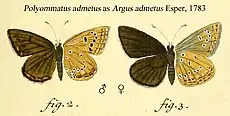Polyommatus admetus
Polyommatus admetus, the anomalous blue, is a butterfly of the family Lycaenidae. It was described by Eugenius Johann Christoph Esper in 1783. It is found in south-eastern Europe and Turkey.
| Polyommatus admetus | |
|---|---|
 | |
| Scientific classification | |
| Domain: | Eukaryota |
| Kingdom: | Animalia |
| Phylum: | Arthropoda |
| Class: | Insecta |
| Order: | Lepidoptera |
| Family: | Riodinidae |
| Genus: | Polyommatus |
| Species: | P. admetus |
| Binomial name | |
| Polyommatus admetus | |
| Synonyms | |
| |
The wingspan is 30–40 mm.[2] Adults are on wing from June to August.
The larvae feed on Onobrychis species [3] (including O. viciifolia) and Lathyrus species.

Description from Seitz
L. admetus Esp. (81 e). Male and female above dull dark brown, without metallic blue or aeneous gloss; the discocellular spot of the forewing and the black veins mostly distinctly contrasting. The hindwing, especially of the female, bears often obsolescent reddish anal spots. Underside somewhat paler brown than upper, with distinct ocelli, but no basal ocelli on the forewing. In South-East Europe, from Hungary and Galicia through the Balkan Peninsula and Asia Minor to Mesopotamia; also in Spain. — ripartii Frr. (81 f), has on the hindwing below a white mesial streak which extends from the base to the outer margin. More widely distributed than admetus, being found in the Alps, South France, in eastern Europe, Asia Minor, Persia and Turkestan. — Egg at first greenish, later on white. Larva on Onobrychis cristagalli. The butterflies are on the wing in June and July and fly on slopes with sparse vegetation, settling particularly on lavender. They are plentiful in most places where they occur.[4]
Subspecies
- Polyommatus admetus admetus (south-eastern Europe)
- Polyommatus admetus anatoliensis (Forster, 1960) (Turkey)
_(8145302378).jpg.webp) 81e, f
81e, f
Etymology
Named in the Classical tradition.In Greek mythology Admetus of Pherae was a friend of Hercules.
References
- Polyommatus at Markku Savela's website on Lepidoptera
- lepidoptera.pl
- "Captain's European Butterfly Guide". Archived from the original on 2016-03-03. Retrieved 2012-10-24.
- Adalbert Seitz] in Seitz, A. ed. Band 1: Abt. 1, Die Großschmetterlinge des palaearktischen Faunengebietes, Die palaearktischen Tagfalter, 1909, 379 Seiten, mit 89 kolorierten Tafeln (3470 Figuren)